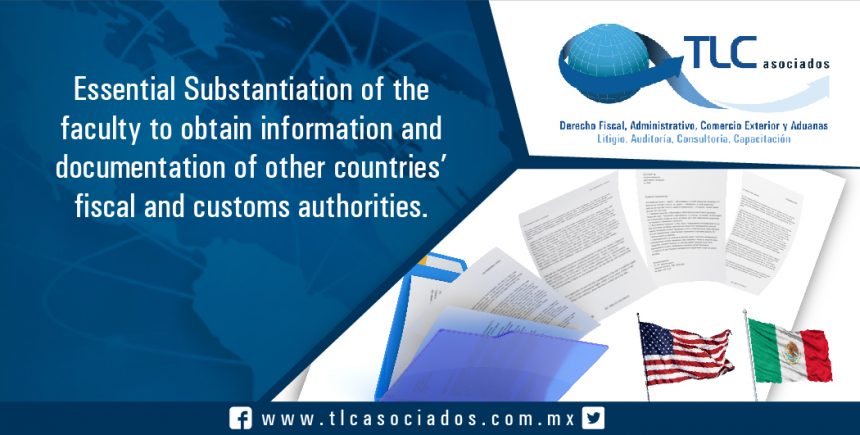
045 – Essential Substantiation of the faculty to obtain information and documentation of other countries’ fiscal and customs authorities
Ciudad de México, a 08 de marzo de 2017.
El día 03 de enero de 2017, se publicó la Tesis con número VIII-TAS-10, con rubro “ADMINISTRACIÓN CENTRAL DE INVESTIGACIÓN Y ANÁLISIS DE COMERCIO EXTERIOR. LA FACULTAD CON QUE CUENTA PARA OBTENER INFORMACIÓN Y DOCUMENTACIÓN DE LAS AUTORIDADES FISCALES Y ADUANERAS DE OTROS PAÍSES, SE ENCUENTRA CONTEMPLADA TANTO EN EL ‘ACUERDO ENTRE EL GOBIERNO DE LOS ESTADOS UNIDOS DE AMÉRICA Y EL GOBIERNO DE LOS ESTADOS UNIDOS MEXICANOS SOBRE ASISTENCIA MUTUA ENTRE SUS ADMINISTRACIONES DE ADUANAS’ COMO EN EL REGLAMENTO INTERIOR DEL SERVICIO DE ADMINISTRACIÓN TRIBUTARIA”, mediante el cual, el Tribunal Federal de Justicia Administrativa determina que, no obstante las autoridades fundamenten su competencia con que cuentan para obtener información y documentación de las autoridades fiscales y aduaneras de otros países, únicamente en el Reglamento Interior del Servicio de Administración Tributaria, no convierte en ilegal su actuación.
Lo anterior, toda vez que, de acuerdo a la interpretación en el presente criterio, el Tribunal Federal de Justicia Administrativa, considera que, la facultad con que cuenta la Administración Central de Investigación y Análisis de Comercio Exterior, para obtener información y documentación de las autoridades fiscales y aduaneras de otros países, se prevé tanto en el “Acuerdo entre el Gobierno de los Estados Unidos Mexicanos sobre asistencia mutua entre sus administraciones de aduanas”, por lo que, en los actos de las autoridades no será necesaria su fundamentación en el referido ordenamiento, “siempre y cuando se fundamente su competencia en el Reglamento Interior del Servicio de Administración Tributaria”.
Con la decisión en el presente criterio, se pretende dar certeza legal a los gobernados, sobre los dispositivos normativos a los cuales se encuentran obligadas a fundamentar las autoridades administrativas aduaneras y de comercio exterior, en sus respectivas actuaciones, haciendo con ello visibles los marcos de legalidad en los que éstas deberán conducirse.
Sin otro asunto en particular quedamos a sus órdenes para cualquier duda o aclaración respecto de la presente información.
Atentamente
División Legal
TLC Asociados, S.C.
tlcnegocios@www.tlcasociados.com.mx
Prohibida la reproducción parcial o total. Todos los derechos reservados de TLC Asociados, S.C. El contenido del presente artículo no constituye una consulta particular y por lo tanto TLC Asociados, S.C., su equipo y su autor, no asumen responsabilidad alguna de la interpretación o aplicación que el lector o destinatario le pueda dar.
March 8th, 2017 in Mexico City.
On January 3rd, 2017, the Thesis number VIII-TAS-10, named “CENTRAL ADMINISTRATION OF FOREIGN TRADE INVESTIGATION AND ANALYSIS. THE GIVEN FACULTY TO OBTAIN INFORMATION AND DOCUMENTATION OF OTHER COUNTRIES’ FISCAL AND CUSTOMS AUTHORITIES IS CONTEMPLATED IN BOTH THE ‘AGREEMENT BETWEEN THE GOVERNMENT OF THE UNITED STATES AND THE GOVERNMENT OF THE MEXICAN UNITED STATES ON MUTUAL ASSISTANCE BETWEEN THEIR CUSTOMS ADMINISTRATIONS’ AND THE INTERIOR REGULATION OF THE TAX ADMINISTRATION SERVICE”, was published, where the Federal Tribunal of Administrative Justice decides that, yet the authorities substantiate the jurisdiction they have to obtain information and documentation of other countries’ fiscal and customs authorities only in the Interior Regulation of the Tax Administration Service, does not make their action illegal.
This is because in accordance with the interpretation of this criterion, the Federal Tribunal of Administrative Justice considers that the faculty given to the Central Administration of Foreign Trade Investigation and Analysis to obtain information and documentation of other countries’ fiscal and customs authorities is indicated in both the “Agreement between the government of the United States of America and the government of the Mexican United States on mutual assistance between their customs administrations”, therefore, in the actions of the authority the substantiation in such regulation will not be necessary, “ as long as the faculty is substantiated in the Interior Regulation of the Tax Administration Service”.
With the decision of this criterion, it is intended to grant legal certainty to the governed about the normative dispositions to which the customs administrative authorities are obligated to substantiate, in their corresponding actions, and hence making visible the legal frameworks to which these will have to conduct themselves.
Without anything else at this moment, do not hesitate to contact us.
Sincerely,
Legal Division
TLC Asociados, S.C.
tlcnegocios@www.tlcasociados.com.mx
Partial or total reproduction is prohibited. All rights reserved to TLC Asociados, S.C. The content of this article is not a private consultation, therefore, TLC Asociados, S.C., and its team and author, are not responsible for any interpretation or use that the reader or recipient could give to it.
Search
Nuestros servicios
- División de Auditoria Preventiva y de Cumplimiento
- División de Certificaciones OEA-NEEC-CTPAT
- División de Certificación en Materia de IVA/IEPS y Recinto Fiscalizado Estratégico
- División de Blindaje Legal
- División de Consultoría
- División de Lobbying
- Gestoría de Permisos Especiales
- Arquitectura Aduanera
- Revista TLC
- Libros TLC
